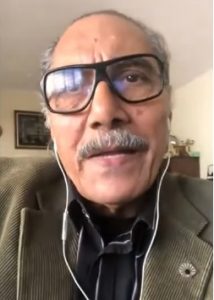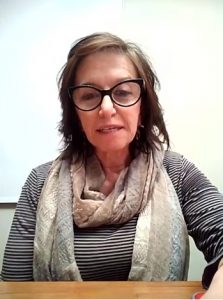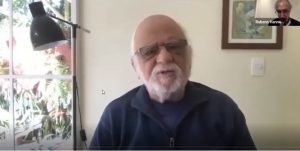São Paulo – The 15th Arab World Film Festival, which is taking place online on digital platforms this year due to the social isolation caused by the coronavirus pandemic, had its opening session last Friday’s (28) night. Getting some 350 viewers, the participants of the online panel discussed the films of the festival, the importance of spreading the Arab culture, the pandemic that led the event to be online, and Lebanon’s tragedy.
Institute of Arab Culture (Icarabe) founder and Arab World Festival producer Soraya Smaili (pictured above) talked about bringing back the first film the festival screened fifteen years ago at Cinesesc. The movie Selves and Others: A Portrait of Edward Said (54 min, France, USA, 2004) brings some of the biography and several conversations with intellectual Edward Said, who died in 2003.

“This movie portrays a little about his life, his career, and talks about the importance of the other for understanding ourselves. And understanding the other is key to see ourselves as coming from an ancient culture but also in a society that sees the other as something alien, thus making the dialogue and human and social development more difficult. This movie means a lot to the institute, as it guided a series of other activities that were based on intellectual Edward Said,” Smaili said.
This year, the festival features four premiers. Curator Arthur Jafet talked about the movies. “I will start by talking about Lebanon, not just because of the unfortunate tragedy that took place on August 4 in its capital but also because of the power that the Lebanese film industry has shown over the last years,” Jafet said.
One film is Beirut, La Vie en Rose (73 min, Spain, 2019) by Èric Motjer. “Beirut, La Vie en Rose undoes the image that the mass media portrays about Lebanon as a war zone. Following the testimonies of famous people of the most traditional sectors of the Lebanese society, we are immersed in a world where the individuals overcome their fear of the future to live their life to the fullest as if nothing had changed,” the curator said.
Online

Smaili said that hosting the event online makes it possible to making the dialogue alive, as well as helping to protect the Arab and Brazilian society. “We are following all isolation norms, as it must be now, but this will take our dearest Arab World Film Festival across Brazil and Latin America, too,” he said.

Arab Brazilian Chamber of Commerce (ABCC) cultural director Silvia Antibas said that hosting the festival at home will increase the number of viewers. “The last I heard was that the platform had over 600 people registered, which is more than the capacity of the physical cinemas,” she said.
Icarabe president Mohamed Habib said that the institute made sure to not interrupt “our annual pilgrimage to the Arab cinema,” which has become a cultural landmark of the city of São Paulo over the last fifteen years.
“The coronavirus pandemic is certainly very heartbreaking for all of us, and we are hosting the film festival in this context as our mission is making possible a cultural interaction with what happens in the daily life of the world in general and the Arab world in particular,” he said.

For ABCC president Rubens Hannun, the festival at home also means to keep spreading about the Arab culture. “It doesn’t stop even in this atypical, important year, and this is a major victory. It’s extremely important, and we must keep spreading the Arab culture, behavior and customs for Brazilians and the Arab community,” he said.
Hannun also agrees that hosting the event online will make it possible for the festival to reach more people across Brazil. “I’m sure a higher number of people will watch the movies, including many from across Brazil that wouldn’t have access to it if it were a presential event as it has been over the last 14 years. Maybe in the following years we could make something hybrid, both presential and virtual, for all Brazilians to have access to it,” he suggested.
Arab worlds
Antibas said that the Arab world is very diverse. “The Arab world festival is actually the festival of the Arab worlds, which are very different from each other. It’s a variety of points of views that enriches those watching and discussing it. We learn a lot by watching these films from the points of views of directors that tell us a little of their words. I like to say it in the plural because the Arab world is really diverse,” she said.

SESC São Paulo director Danilo Santos de Miranda said that this is one of the most important manifestations of the contemporary cinema. “It is very significant for us to know about these productions from countries that we often can’t show in Brazil,” he said. He believes that bringing the Arab world cinema production to Brazil is making it possible to learn more about the imaginary, the traditions, the knowledge. the worldview and everything that is present in the Arab culture.
Watch the full event on YouTube.
All participants of the panel expressed their sympathy towards Lebanon and the Lebanese community. Rubens Hannun pointed out that the ABCC is holding a donation campaign for the country.
After the online opening event, documentary film Gaza (100 min, Ireland and Palestine, 2019,) had its premiere in Brazil. Directed by Garry Keane and Andrew McConnell, the film portrays the everyday life of Gazan citizens, what they think and how they live with the economic blockade. The confrontations at the Israeli borders that leave local young men hurt and cut lives short are shown as a routine in Gaza. The citizens always say: We just want to live our lives in peace.
Find out more about the festival. All movies are available on the Icarabe website from August 28 to September 13 for registered users. Four films will be viewable on the SESC website on Mondays from August 31 to September 21.
The Arab film festival is taking place until September 21. The event brings four premieres to Brazil, plus a selection of 12 motion pictures featured in the event over the last 15 years. Also featured will be four online meetings with directors and guests.
The festival is hosted by the Institute of Arab Culture (Icarabe), featuring SESC São Paulo as a co-host, and sponsored by the Arab Brazilian Chamber of Commerce (ABCC), with support from Instituto do Sono and the Federation of Muslim Associations in Brazil (Fambras).
Translated by Guilherme Miranda




